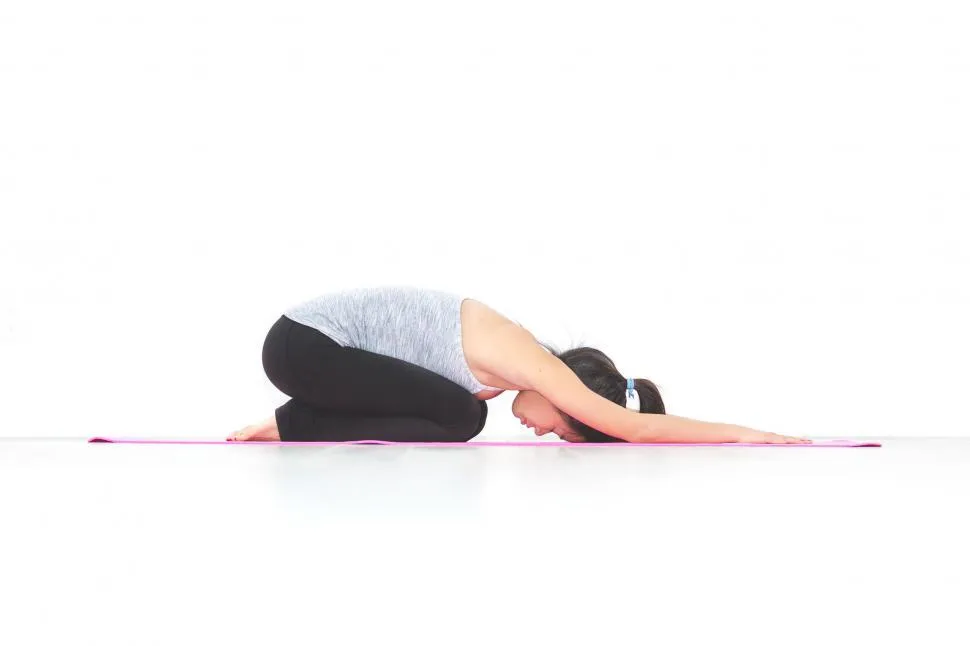Does Yoga Have Health Benefits? Here's What You Need To Know
Table of Contents
- Introduction
- Stress Reduction Through Yoga
- Improved Flexibility And Strength
- Enhanced Mental Clarity And Focus
- Better Sleep Quality
- Boosted Immune System Function
- Emotional Balance And Well-being
- Making Yoga Accessible For Everyone
- Integrating Yoga Into Daily Life
- Conclusion
Introduction: Does Yoga Have Health Benefits?
Yoga's journey from the banks of the Indus River to modern-day wellness studios worldwide is remarkable. This holistic practice has evolved over centuries, rooted in ancient traditions, cultivating a rich tapestry of philosophies and techniques to promote harmony between mind, body, and spirit.
Today, yoga transcends cultural boundaries, drawing in diverse practitioners from busy professionals seeking stress relief to fitness enthusiasts searching for a new challenge. This broad appeal speaks not only to its multifaceted nature but also to its adaptability in addressing contemporary health concerns.
What's fascinating is how yoga serves as a bridge across generations and backgrounds. Whether it’s a serene restorative session enjoyed by seniors or an energetic vinyasa flow attracting college students, individuals find personal significance within its embrace.
The increasing popularity among various demographics highlights an intrinsic human desire for balance and well-being especially crucial in our fast-paced lives. More than just physical exercise, yoga offers tools for mental clarity and emotional resilience, making it an appealing choice for anyone looking to enhance their quality of life while connecting with an age-old tradition steeped in wisdom and introspection.
Does Yoga Have Health Benefits For Stress Reduction?
Yoga is a powerful antidote to the mounting stress of daily life, offering techniques that not only usher in relaxation but also actively lower cortisol levels the hormone often linked to stress. Poses such as Child’s Pose and Forward Bend encourage deep breathing and physical release, signalling the body to shift from its fight-or-flight response into a state of calm.
This transition helps restore balance within both the mind and body, creating an environment where resilience can flourish.

Incorporating mindfulness practices within yoga enhances this stress-reduction benefit exponentially. Mindfulness encourages practitioners to become fully present, directing attention away from racing thoughts or external pressures. This intentional focus cultivates an inner sanctuary where anxiety diminishes, creating space for clearer perspectives and emotional clarity.
Over time, these practices can transform one’s relationship with stress, equipping individuals with tools to respond more effectively rather than react impulsively ultimately paving the way for lasting peace in an ever-busy world.
Does Yoga Have Health Benefits For Flexibility And Strength?
Regular yoga practice is a transformative journey that significantly enhances physical flexibility. Each pose is designed to stretch and engage various muscle groups, gently easing tension while promoting the range of motion.
As practitioners move through their sessions, they cultivate muscular elasticity and improved joint health, which can lead to a more fluid and graceful way of moving in daily life. This newfound flexibility often transcends the mat, helping to alleviate stiffness and discomfort from everyday activities.
Moreover, as you delve deeper into yoga, you'll discover a profound link between flexibility and core strength development. Poses such as Boat Pose or Plank not only challenge your balance but also activate the deep stabilizing muscles around your abdomen.
A strong core becomes the foundation upon which enhanced mobility rests—supporting posture while preventing injuries during both workouts and daily motions. By harmonizing flexibility with core strength, yoga equips you with an empowered body that navigates life's demands with greater ease and resilience.
Does Yoga Have Health Benefits For Mental Clarity And Focus?
Meditation is a cornerstone of yoga that significantly enhances mental clarity and focus, making it easier to engage deeply in each session. Scientific studies have shown that the combination of mindfulness meditation with physical postures can lead to notable improvements in concentration.
For instance, research published in the journal Psychological Science found that individuals who practised yoga regularly exhibited better attention spans and higher cognitive flexibility compared to those who did not practice. This is largely attributed to the meditative aspect of yoga, which trains practitioners to direct their thoughts purposefully while calming their minds.
Moreover, as yogis learn to breathe consciously and remain present during their practice, they cultivate a profound sense of awareness that extends beyond the mat. A study from Harvard University highlighted that even short-term mindfulness practices can reshape brain structure, enhancing areas responsible for cognitive function and emotional regulation.
By integrating meditation into yoga routines, practitioners not only deepen their connection with themselves but also sharpen their ability to concentrate on tasks throughout daily life. Embracing this dual approach fosters a holistic focus that empowers individuals both on and off the mat an invaluable insight for anyone seeking transformative health benefits through yoga.
Does Yoga Have Health Benefits For Better Sleep Quality?
Specific yoga poses can play a transformative role in enhancing sleep quality by promoting relaxation and reducing tension in both the mind and body. Poses such as:
Child’s Pose,
Legs-Up-The-Wall,
and Cat-Cow stretch
not only encourage physical release but also activate the parasympathetic nervous system, which helps to calm racing thoughts and anxiety often associated with bedtime. Emphasizing deep, rhythmic breathing during these practices allows you to cultivate mindfulness a vital ingredient for unwinding after a long day.
Moreover, engaging in regular yoga sessions creates a consistent physical activity routine that has been shown to improve overall sleep patterns. When you incorporate gentle flows into your daily regimen, you stimulate blood circulation while simultaneously lowering heart rates and cortisol levels factors pivotal to achieving restful sleep.
This combination of mental clarity and bodily ease sets the stage for deeper slumber, allowing your body to heal more effectively overnight. By forging this connection between movement and rest, individuals may find themselves on a path towards improved sleep hygiene that extends beyond their mats into everyday life.
Does Yoga Have Health Benefits For Boosting The Immune System?
Yoga has long been revered not just for its physical benefits but also for its profound impact on mental well-being, leading to a notable enhancement in immune system function. Through various poses and mindful breathing techniques, yoga helps alleviate stress a major contributor to immune suppression.
When the body is under stress, it produces cortisol, which can negatively affect the inflammatory response and make us more susceptible to illnesses. By integrating yoga into your routine, you foster a state of calm that promotes balanced cortisol levels, allowing your immune defences to regain their strength.
Moreover, certain yoga practices like pranayama (breath control) have been shown to improve lung capacity and oxygenation of the blood. This increased oxygen flow enhances cellular health and vitality while aiding lymphatic drainage essential processes for effective immunity.
Engaging in regular sessions of yoga not only cultivates physical flexibility but also rejuvenates the body's internal systems. The harmonious blend of movement, breathwork, and mindfulness empowers practitioners not only to fend off illness but also to recover faster when they encounter pathogens.
In this way, yoga emerges as an invaluable ally in the quest for robust health that transcends mere exercise; it’s a holistic approach supporting our body's natural defences against everyday challenges.
Does Yoga Have Health Benefits For Emotional Balance And Well-being?
Yoga serves as a profound tool for cultivating emotional balance and enhancing overall well-being. By integrating mindfulness into movement, individuals become more attuned to their emotions, fostering self-awareness that is often overlooked in the hustle of daily life.
As practitioners sink into various poses, they learn to recognize and honour their feelings without judgment, paving the way for healthier emotional responses. This awareness not only allows them to process their emotions but also strengthens their resilience, enabling them to navigate life's challenges with greater ease.
Breathwork is a vital component of this journey towards emotional stability. Techniques such as diaphragmatic breathing or alternate nostril breathing create a direct link between breath and emotional state. When faced with stress or anxiety, engaging in intentional breathwork can ground us in the present moment, calming racing thoughts and soothing heightened emotions.
This practice transforms our reactions from impulsive responses to mindful choices, allowing us to cultivate a sense of control over our emotional landscape. In embracing these techniques through yoga, we equip ourselves with lifelong tools for managing stress and fostering inner peace amidst external chaos.
Does Yoga Have Health Benefits: Making Yoga Accessible For Everyone
Embracing yoga can seem daunting, especially for beginners or those with physical limitations, but it’s a journey meant for everyone. To start, focus on finding a space that feels safe and quiet your sanctuary for practice. Begin with gentle poses like Cat-Cow or Child's Pose, allowing your body to adjust without pressure.
For those who might struggle with balance or flexibility, the use of props like blocks and straps can provide the support needed to enhance comfort and safety in each pose.
Moreover, consider joining a class specifically designed for beginners or mixed abilities where instructors are trained to offer modifications tailored to individual needs. Practicing mindfulness during sessions not only aids in physical alignment but also fosters mental clarity, making adjustments feel more natural over time.
Remember that observing your breath is fundamental; even small movements synchronized with deep breaths can be transformative. By cultivating self-compassion and patience throughout this process, you'll cultivate a lifelong love for yoga that’s accessible at any stage of life.
Does Yoga Have Health Benefits When Integrated Into Daily Life?
Integrating yoga into daily life extends far beyond the confines of a mat. One effective way to weave yogic principles into your family routines is by creating mini-mindfulness moments.
Encourage your family to engage in a minute of deep breathing together before meals or bedtime, fostering a shared sense of calm and connection. You can also adopt practices like gratitude journaling as a family activity, where each member shares three things they're thankful for, promoting positivity and awareness.
In the workplace, consider embracing the idea of office yoga by incorporating simple stretches during breaks or setting aside time for guided meditations. These practices can boost productivity while alleviating stress.
Furthermore, adopting compassion-driven communication inspired by yogic teachings can transform interactions with colleagues – think active listening and speaking with kindness.
By seamlessly integrating these principles into everyday settings, you cultivate an environment rich in balance and mindfulness – proving that yoga is truly a lifestyle rather than just an exercise regimen.
Final Thoughts: Exploring The Health Benefits Of Yoga
In embracing a regular yoga practice, you embark on a journey rich with profound health benefits that extend far beyond physical flexibility. From enhancing mental clarity and emotional resilience to reducing stress levels through mindful breathing, yoga becomes more than just an exercise; it transforms into a holistic approach to wellness.
Research continually points to the powerful connection between body and mind, revealing how each session on the mat can bolster your immune system, improve sleep quality, and foster greater self-awareness.
Moreover, yoga serves as a beautiful reminder of the importance of self-care in our fast-paced lives. It encourages us to pause, breathe deeply, and connect with ourselves amidst chaos an act that can lead to lasting shifts in our overall well-being.
As you consider integrating this transformative practice into your routine, remember that every small step counts. Whether you're an absolute beginner or looking to deepen your existing practice, each moment spent on the mat is an investment in better health.
So why wait? Start today by setting aside just 10 minutes for some gentle stretches or mindfulness exercises. Explore local studios or online classes that resonate with you; take advantage of this opportunity to embrace the multitude of health benefits waiting for you! Join the vibrant community of individuals who are already reaping these rewards your body and mind will thank you!
People Also Asked
What are the primary health benefits of yoga?
Yoga offers benefits such as improved flexibility, stress relief, better sleep, and enhanced mental clarity.
Can yoga help with stress management?
Yes, yoga reduces cortisol levels and promotes relaxation, helping to manage stress.
Is yoga beneficial for beginners?
Absolutely! Yoga is accessible to all skill levels, with modifications available for beginners.
How does yoga improve flexibility?
Yoga poses stretch and strengthen muscles, gradually enhancing flexibility and range of motion.
Can yoga improve sleep quality?
Yes, certain poses like Child’s Pose and Cat-Cow promote relaxation, which can improve sleep quality.
Does yoga boost the immune system?
Regular yoga practice reduces stress hormones and increases oxygen flow, supporting immune function.
How often should I practice yoga to see the benefits?
Practicing 2-3 times a week can offer noticeable improvements in physical and mental well-being.
What type of yoga is best for stress relief?
Restorative and Hatha yoga are great for reducing stress due to their slow, calming nature.
Can yoga help with emotional well-being?
Yes, yoga promotes mindfulness and emotional awareness, contributing to emotional stability and well-being.
Is yoga effective for improving mental clarity?
Yes, yoga integrates meditation and breathwork, which improves focus, cognitive function, and mental clarity.





